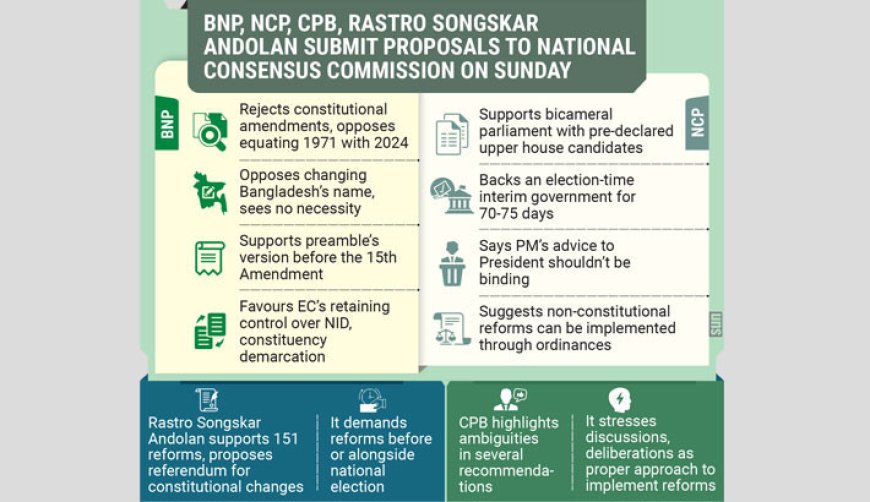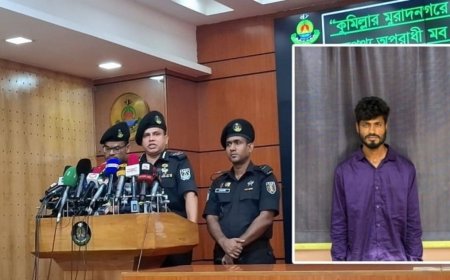BNP states that drawing parallels between 1971 and 2024 is unwarranted
NCP approves 113 reform proposals.

BNP Rejects Constitutional Amendments; NCP Backs Key Reforms
The Bangladesh Nationalist Party (BNP) has opposed proposed amendments to the constitution’s preamble, arguing that equating the 1971 Liberation War with the 2024 uprising is inappropriate. The party has also rejected proposals to change the country’s name.
Meanwhile, the National Citizen Party (NCP) has endorsed 113 out of 166 reform recommendations, including the introduction of a bicameral parliament.
Both parties submitted their positions to the National Consensus Commission, highlighting disagreements over electoral governance, constitutional amendments, and the role of an interim government.
The Consensus Commission meeting began at 9:30 AM and continued until noon. Several political parties, including the Communist Party of Bangladesh (CPB) and the Rastro Songskar Andolan, also participated. The meeting was attended by the Commission’s Vice President, Prof. Ali Riaz, along with members Safar Raj Hossain, Badiul Alam Majumdar, Dr. Iftekharuzzaman, and the Chief Adviser’s Special Assistant, Monir Haider.
Diverging Political Stances on Reforms
The Rastro Songskar Andolan advocated for a referendum on constitutional reforms before the national elections.
The CPB, on the other hand, expressed concerns over ambiguities in several of the 166 recommendations, emphasizing that discussions and deliberations are essential for implementing reforms.
BNP’s Objections
Following the submission of BNP’s written objections, Standing Committee member Salahuddin Ahmed criticized the omission of the preamble in the reform proposal’s spreadsheet, stating that the preamble is a fundamental part of the constitution and should remain unchanged.
“The proposal places the 1971 Liberation War and the 2024 uprising on the same level, which we find inappropriate. This issue should be addressed separately or included in the constitution’s schedule,” he said.
The BNP also rejected suggestions to rename the state, arguing that the existing name is well-established among the people and that any change would be unnecessary.
Additionally, the party reaffirmed its support for the preamble as it was before the 15th Amendment and advocated for the Election Commission to retain control over national ID registration and constituency demarcation.
NCP’s Support for Key Reforms
In contrast, the NCP adopted a more flexible stance, agreeing with 113 of the 166 proposed reforms.
Speaking to journalists, NCP Joint Convenor and Reform Coordination Committee Coordinator Sarwar Tushar said the party supports reforms that do not require constitutional amendments.
“We believe non-constitutional reforms can be enacted through ordinances, while constitutional changes should be decided through a Constituent Assembly election,” he stated.
The NCP also supported the introduction of a bicameral parliament but insisted that political parties declare their upper house candidates before elections, ensuring voter transparency.
Regarding the prime minister’s role, the party proposed that while the premier could advise the president, such advice should not be binding.
Additionally, the NCP backed the idea of an election-time interim government, suggesting a tenure of 70 to 75 days. However, the party noted that in the future, this system might become unnecessary, as a proposed constitutional council could take over election oversight responsibilities.
Rastro Songskar Andolan Agrees on 151 Reforms
Hasnat Kaiyum, Chief Coordinator of the Rastro Songskar Andolan, stated that his party supports 151 out of the 166 proposed reforms, partially agrees with 10, and opposes 5.
He emphasized that constitutional reforms should be implemented before or alongside the national elections rather than being left to a newly elected parliament. This could be achieved through either a referendum or a separate election for a constitutional reform assembly.
Hasnat Kaiyum also proposed renaming the secularism policy, suggesting that the term “secularism” be replaced with “religious freedom and communal harmony” while maintaining all existing provisions.
CPB Seeks Further Discussions
CPB General Secretary Ruhin Hossain Prince criticized the approach of simply ticking boxes for reform implementation. Instead, he emphasized the need for thorough discussions and deliberations.
The CPB is waiting to engage in further talks with the National Consensus Commission. Ruhin Hossain made these remarks after meeting with the commission at the LD Hall of the Parliament Building on Sunday.
What's Your Reaction?





















































































